Background
At the repeated invitation of Pearl S. Buck, who had sponsored the publication of Lin's bestselling My Country and My People in 1935, Lin left China for New York in August, 1936 to write The Importance of Living , which was published in August 1937 to even greater success just as war broke out in China. In 1938, Lin left New York to spend a year in Paris, where he wrote Moment in Peking. [1]
Lin wrote the book in English for a U.S. audience, yet he based it in Chinese literature and philosophy. As an exercise, before he started to compose Moment in Peking, Lin translated passages from the classic Chinese novel Dream of the Red Chamber , and followed its example in showing a spectrum of characters in their social settings and defining them through their clothing, jewelry, and footwear, and even by their language (dialect), geography (region), and foodways. [2] Lin's eldest daughter Lin Rusi also indicates in an introductory essay to a Chinese translation of Moment in Peking that the entire book was influenced by Zhuang Zi and its message was "Life is but a dream." [3]
Lin tries not to be overly judgemental of the characters because he recognizes that too many issues were involved in the chaotic years of early twentieth century China. There are no absolutely right or wrong characters. Each character held a piece of truth and reality and a piece of irrationality. In the preface, Lin writes that "[This novel] is merely a story of... how certain habits of living and ways of thinking are formed and how, above all, [men and women] adjust themselves to the circumstances in this earthly life where men strive but gods rule."
While Lin does not display hatred toward the Japanese, he does let events and situations affect the novel's characters to let the reader clearly see the reason the Chinese are still bitter about Japan's military past. The novel ends with a cliffhanger, letting readers hope that the major characters who fled from the coastal regions to the inland of China would survive the horrible war. In the final pages of the book Lin observes: "What an epic story was being lived through by these people of China.... And it seemed to them that their own story was but a moment in old, ageless Peking, a story written by the finger of Time itself.... In this moving mass of refugees, there was now neither rich nor poor." [4]
The sequel, A Leaf in the Storm , published in 1941, does not follow the same characters, but takes up in 1937, at roughly the point in time when Moment in Peking leaves off.
Main characters
Many characters are from three wealthy families: Yao, Tseng (Zeng), and New (Niu), but characters from other families play an integral part in the story, such as Lifu, from the Kong family.
The protagonist of the story, Mulan, is from the wealthy Yao family. During the Boxer Uprising many people left Peking and fled to other regions to avoid the turmoil and chaos of war. On the way to Hangchow she is separated from her family and then seized and sold to a human trafficking group, Fortunately the Tseng family track her down and buy (rescue) her. The two families become close friends and possible future in-laws. Mulan is lively, beautiful, intelligent and generous, as well as responsible. Her father has always encouraged her interests, among them her interest in "oracle bones," which reveal ancient Chinese characters, and the singing of Chinese opera. Kung Lifu and his mother, Mrs.Kung are family friends of the Yaos. Both Mulan and Mochow have found Lifu to be deep, erudite, and virtuous: a promising future scholar and an interesting figure. Mulan is attracted to Lifu, but marriage and a romantic relationship had not crossed his mind. On the other hand, her reunion with her family seems so mysterious a circumstance, that on some level she feels that marriage with Sunya is fated. So with blessings from both families, she marries Sunya. Their marriage is mostly peaceful and harmonious. Together they have three children: Aman, Atung and Amei.
- Tseng Sunya (Zeng Sunya, 曾蓀亞)
Mulan's husband, Tseng Sunya, is affectionately called "Fatty" by Mulan. As the youngest son of his family, Sunya is arguably the least responsible one, but has what is called a "round character". He and Mulan had gotten to know each other well when they were children after Mulan was rescued from bandits by his parents. As the two families became increasingly close, their engagement was planned happily.
- Kung Lifu (Kong Lifu, 孔立夫)
A scholar and Yao Mochow's husband, he marries Mochow but he admires Mulan. He was a biology professor at a school in Peking and also fight for democracy and law in China. He is a member of Chiang Kai-shek's Nationalist Party.
- Yao Mochow (Yao Mochou, 姚莫愁)
Yao Mulan's sister, she is also very clever and attractive. She married Lifu, when he was a poor scholar, and unlike many marriages in the olden times, she had an eye for Lifu long before their engagement. Mochow is stable, reliable and extremely responsible. She takes care of her sick mother for years, remaining by her side. She knows her sister's love for Lifu, but she is confident in their sisterly love.
- Yao Sze-an (Yao Si'an) (姚思安)
He was a playboy when he was young. However, he has become a great Taoist monk later. He influenced Lifu very much. Sze-an was also interested in "oracle bones"
A traditional Chinese woman. She loves her oldest son, Tijen, best. She opposes Tijen and Yinpin's love, and causes her death. She becomes depressed, unable to talk, and very weak for the rest of her life.
- Shanhu(珊瑚) Shanhu is the oldest child of the Yao family. Though her family name is Xie, not Yao, she has always considered the Yaos as her real family. Her father, Mr.Xie, is a close friend of Yao Si-an's. Yao Si-an and his wife took her in and raised her along. They treated her as if she was one of their own. She is second in command when it came to daily routines in the house and has been a great help to Mrs. Yao. She was 19 years old when she married a fine young man, who died a year later and left her childless and alone. So she returned home.
- Cassia (Auntie Gui, 桂姨)
The concubine or maid in the Tseng household. She has two daughters Ailien and Lilien, who become modern ladies and married doctors.
A typical old Northeastern officer, honest and kind, but hates everything about foreign countries.
The strong-willed leader of the Tseng family. She holds the family together, and she likes Mulan and Mannia, but Suyun's behavior annoys her.
- New Suyun (Niu Suyun, 牛素雲)
Her parents thought Chinya was a man who had the right character to be a successful officer, so Suyun marries him. During their marriage, she bosses and orders him around like a busboy. Suyun later becomes a friend of Inging, her second brother's concubine. She divorces Chinya, and becomes an officer's concubine and also the infamous Japanese-controlled heroin dealer known as the "White Powder Queen." When she finally recognizes her mistake she is killed by the Japanese army.
Married to the Tseng's eldest son, Pingya. She becomes a widow the week after her wedding. She adopts a child, Asuan, and remains in the Tseng family. She commits suicide during the Japanese war, and remains a virgin till her death.
The second son of the New family. He leaves his wife and four children, and marries a singsong girl (also a prostitute) named Niu Inging (牛鶯鶯). He betrays his country, and is nearly killed by his eldest son.
- Tseng Chinya (Zeng Jinya, 曾經亞)
The second son of the Tseng family, a weak character who asks just to have a peaceful life. He was kind to everybody. He falls in love with Anxiang.
The eldest son of the Tseng family. He loves Manni but dies the week after his wedding.
Kidnapped when she was a child, and meets Mulan. When Mulan is saved by Mr. Tseng, Dim Fragrance is sold to another family. She becomes a nursery maid of Mulan's child some years later. She finally found her family, and becomes Jinya's second wife.
- Tsao Lihua (Cao Lihua, 曹麗華)
A young art student. She meets Sunya in Hangzhou, and falls in love with him. Sunya lies to her that his wife was an old and fat country woman. When she met Mulan, she is surprised, and eventually became her friend.
- Yao Tijen (Yao Tiren, 姚體仁)
Mulan's older brother, a selfish dandy. His father sent him to England to study, but he spent all of the money in Hong Kong. He falls in love with his servant girl Yinpin, and has a son with her. Their love is opposed by his mother. After Yinpin's suicide, he works hard in his uncle's drug store and dies in an accident.
Mulan's younger brother.
- Tung Paofen (Dong Baofen, 董寶芬)
A Manchu princess. Her family once owned the gardens which became the Yao's later. Her family believed that there were great treasures buried in the garden, and sent her to Yao family to work as a servant girl and to find the treasure. She marries Afei after Hongyu's death.
Mulan, Mochow, and Afei's cousin. She is madly in love with Afei, and admires the famous character Lin Daiyu from the classic novel Dream of the Red Chamber (紅樓夢). When she misunderstands a conversation and thinks that Afei doesn't love her, she drowns herself, or so it seems. She dies in vain, leaving her parents devastated. Her death provides a reflection on the Yaos: ill-mannered, irresponsible, negligent. The so-called blood-ties are so weak when it comes to real commitment.
Reception and influence
Time magazine wrote that Moment in Peking is "modeled exactly on traditional Chinese novels," which are among the world's longest, oldest, and most thickly populated with characters. The novel, "far superior to Author Lin's whimsical The Importance of Living, may well become the classic background novel of modern China." [5] The magazine named it as one of nine novels that were "Books of the Year" in 1939. Others included Finnegans Wake by James Joyce and The Grapes of Wrath by John Steinbeck. [6]
The New York Times reviewer wrote that "Mr. Lin has filled some 800 pages with a picturesque and leisurely account of how contemporary China grew and learned to live and adjusted itself to the fact, as he says in a preface, that 'men strive but the gods rule.'" The old has given way to the new, the review goes on, but Lin does not try to say which is right or wrong. "By Western standards it is a somewhat formless record, not always easy to follow," but "by any standards it has strength, tolerance, humor, color, and dignity." The reader should see why, he concludes, Pearl Buck has called in "the great novel of modern China." [7]
The scholar Zuzana Dudasova, writing in 2019, called Moment In Peking a "great novel", and went on to compare how Lin used the Daoist, Confucian, and popular elements with Pearl Buck's use of them in The Good Earth . In each, the author uses a distinctively Chinese worldview to give depth and metaphorical meanings to the story.

Hua Mulan is a legendary folk heroine from the Northern and Southern dynasties era of Chinese history.

Yao Wenyuan was a Chinese literary critic, politician, and member of the Gang of Four during China's Cultural Revolution.
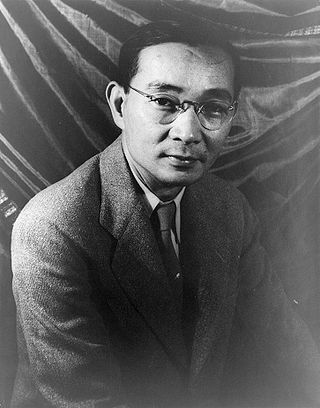
Lin Yutang was a Chinese inventor, linguist, novelist, philosopher, and translator. He had an informal style in both Chinese and English, and he made compilations and translations of classic Chinese texts into English. Some of his writings criticized the racism and imperialism of the West.

Romance of the Western Chamber, also translated as The Story of the Western Wing, The West Chamber, Romance of the Western Bower and similar titles, is one of the most famous Chinese dramatic works. It was written by the Yuan dynasty playwright Wang Shifu (王實甫), and set during the Tang dynasty. Known as "China's most popular love comedy," it is the story of a young couple consummating their love without parental approval, and has been seen both as a "lover's bible" and "potentially lethal," as readers were in danger of pining away under its influence.
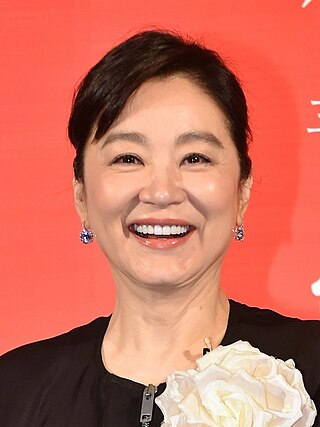
Brigitte Lin Ching-hsia is a Taiwanese actress. She is regarded as an icon of Chinese language cinema for her extensive and varied roles in both Taiwanese and Hong Kong films.
Victor Huang Wei-de is a Taiwanese actor and singer.

Waiting (等待) is a 1999 novel by Chinese-American author Ha Jin (哈金) which won the National Book Award the same year. It is based on a true story that Jin heard from his wife when they were visiting her family at an army hospital in China. At the hospital was an army doctor who had waited eighteen years to get a divorce so he could marry his long-time friend, a nurse.
Mulan or Hua Mulan is a legendary figure from ancient China said to have taken her father's place in the army.
Mulan Jr. is a one-act stage musical based on the 1998 Disney animated film Mulan, which in turn was based on the Chinese legend of Hua Mulan and the story "Fa Mulan" by Robert D. San Souci. The adaptation mixes songs featured in the 1998 film as well as deleted songs from the film, including the revival of songs written by Stephen Schwartz, who was the original composer for the 1998 film before leaving to work on The Prince of Egypt. The musical is G-rated, any mature content from the sources it is based on having been deleted in the adaptation. The cast includes 26 roles plus an ensemble. The show was taken down from MTI's website in the summer of 2020, but it's being considered as a re-release but no date is currently set for if that does happen.

Moment in Peking is a 2005 Chinese television series produced by CCTV. It is adapted from the novel Moment in Peking by Lin Yutang, who was nominated for a Nobel Prize in 1940 and 1950.
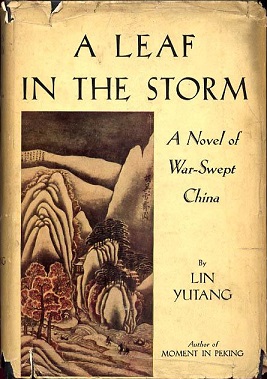
A Leaf in the Storm, a Novel of War-Swept China is a novel written in English by Lin Yutang, published in 1941 by John Day Company. Set in Beiping (Beijing) when it was controlled by the Japanese, the novel describes the years of the Second Sino-Japanese War before the American entrance in 1941. It is a sequel to Lin's Moment in Peking.

Once Upon a Love is a Taiwanese idol romance drama television series written by Yang Yi Xun、Jing Ru and Hui Fen and is directed by Lin Qing Zhen. It stars Sunny Wang, Matt Wu, Cheryl Yang and Reen Yu. The show was aired on GTV on 8 July 2012.
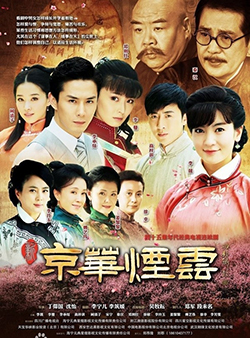
Moment in Peking, sometimes called New Moment in Peking to distinguish it from earlier adaptations, is a 2014 Chinese television series loosely based on Lin Yutang's English-language novel of the same name.

Refresh Man is a 2016 Taiwanese television series created by Sanlih E-Television, starring Aaron Yan, Joanne Tseng, Lene Lai and Jack Lee as the main cast. Filming began on January 27, 2016 and is filmed as it airs. The drama premiered March 6, 2016 on channel TTV, Sunday nights at 10:00 pm.

The Love Song is a 2016 Taiwanese romance, television series starring Miao Ke-li, Lu Hsueh-Feng, Vivi Lee, Darren Chiu, Tracy Chou, Sean Lee, Steven Sun and Julie Ting. Shooting began on January 15, 2016 and episodes aired as soon as the shoot finished. The original broadcast began on February 24, 2016 on SET Metro, airing weekdays at 8:00 pm.
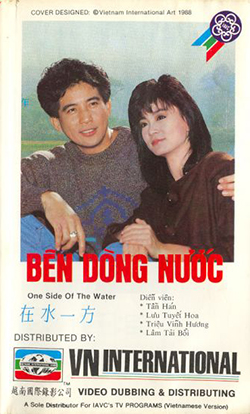
One Side of the Water is a 1988 Taiwanese television drama series produced by Ping Hsin-tao, based on the 1975 film The Unforgettable Character and its associated 1976 novel, both written by his wife Chiung Yao. The series stars Chiung Yao regulars Chin Han and Leanne Liu in the leading roles.

Moment in Peking is a 1988 Taiwanese TV series produced by Chinese Television System, based on Lin Yutang's 1939 English-language novel of the same name, set in Peking (Beijing) in the first half of the 20th century.

Attention, Love! was a 2017 Taiwanese television show produced by Eastern Television. The show starred Joanne Tseng, Prince Chiu, Kuo Shu-yao and Riley Wang. Filming of the show began on October 12, 2016, and concluded on April 4, 2017. It aired on CTV every Sunday at 10:00 pm, starting on July 30, 2017.
Chien Yao is a Taiwanese lyricist and author, known for supporting and beginning the careers of many artists. Yao is known to write about female sentiments. He has supported the careers of many A-list singers. Yao had served in Dian Jiang Records and Sony Music Taiwan, and had been the GM of EMI Records Taiwan, Virgin Records Taiwan, and Music Nation Group Taiwan. Yao is currently retired from executive positions and serves as an exclusive writer for Warner Chappell Music, Hong Kong Limited Taiwan Branch.















